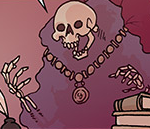|
mellonbread posted:So how do you handle military ranks/authority/chain of command in tabletop RPGs? IME you roleplay a lot of insubordination.
|
|
|
|

|
| # ? May 12, 2024 12:36 |
|
mellonbread posted:I don't think you can get people to agree to a consistent terminology. To everyone else, it's always going to look like the guy presenting the definition is trying to auto-resolve the argument in his favor. Critics do this naturally, as we do with all language: a jargon is developed, it is abused, there's a consensus usage and unconventional usages, and if you get into the deep end sufficiently you find yourself reading academic papers packed with tortured language indecipherable to those not already hopelessly steeped in academia. Which is to say, aldantefax posted:there doesn't need to be a rigorous vocabulary to talk about why people do / don't like a game or its components, at least, but I get this impression from the thread that for others, that point is more important than the criticism or opinion being delivered, which seems to stifle discussion. Myopia and pedantry-for-the-sake-of-it can stifle discussions, definitely, and lots of people get irritated or bored by lengthy arguments over the meaning of some term - "you're arguing semantics" is an accusation of foul play, rather than a supportive statement. But we also already use specialized language in this hobby, and it can be leveraged comprehensibly for critique, and I see that specialized language built upon all the time. For example: we can discuss a game's "mechanics" critically, and do; and gamers generally understand what we mean by that, even if occasionally someone uses the term in a weird way that muddies the waters. Tuxedo Catfish's call for mechanics to be considered as "objects of aesthetic appeal" is using the language of art criticism, including the call to action. Are folks confused by those terms? If they are, a discussion of them needn't be awful. It's important when you're trying to communicate, to be understood, that you use words and phrases that others will interpret as you meant them. Perfect communication is probably an unachievable goal until we develop mind melding technology, that's a fundamental aspect of language, but clarity of communication is on a spectrum and given that criticism is intended to inform and be part of a conversation, it's reasonable to ask that it use language that is as clear as possible. This may mean adopting or developing terms and we shouldn't shy away from that need when it arises. We've got a bunch already. "Rules-lite," "PbtA game," "GM-less," "Indie game," etc. are terms that an outsider to the genre might not understand but most everyone in this thread does. If I say "this system claims to be rules-lite, but there's significant combat crunch weighing it down" that's a criticism using Trad Games terms of art. But we can learn from terms-of-criticism from other arenas, too, like art critique. Theme. Tone. Intent. Response. Form. Function. Flow. What do these mechanics evoke? Do they reference previous works - not by citation, but via cues - a nod to a prior work that is recognizable to those familiar with that prior work? Does character generation in this game subvert genre expectations? Are there additional periods of recognizable and describable architectural movements, beyond just the OSR - or perhaps, within the OSR? And games contain visual art, too. Is the imagery in this product consistent? Provocative? Whimsical? Over-wrought? Simple, or simplified, or simplistic? (Pet peeve: these are not synonyms.) This goes beyond RPGs, too. Is this worker placement game just a bastardization of previous, better works; or is it a coy nod to a genre favorite, with a twist that is simultaenously inspirational and maudlin? aldantefax posted:A few questions: Yes. Both, and more. I can discuss a horror film through comparison of the whole film to other horror films: and, I can also take an aside to discuss the lighting and camera work in a particular scene of that film, making an argument for why they were or weren't effective or appropriate or something, or perhaps to use as an example for how a scene in a different film might have been shot in a way that would improve it. Any of these approaches have potential interest to an audience interested in: movies in general, horror movies in particular, and cinematography in detail. quote:- Does assuming the enjoyment of others (other than yourself) factor into a game's worth either via its commercial success or its aesthetic design? I'm not sure exactly what you mean, but: popularity is one available metric for a work, sometimes; and you can perform surveys or use other approaches to determine broad appeal. Rotten tomatoes rankings seem to help folks. But, in my opinion these aren't really "criticism", they're just statistics. One of the functions of criticism is to enhance an audience's ability to understand a work, which can add to, or subtract from, their enjoyment. Another function is to assist those who are making artworks, providing avenues to discover and implement improvements or at least offer alternatives that might not have otherwise occurred to them. So apologies for the roundabout approach, but I wind up with quote:- Does someone need to necessarily use an agreed upon language for some to criticize something and learn that vocabulary as a prerequisite for delivering an opinion? No, not necessarily. But development of a shared vocabulary is useful, because vocabulary is a tool, and good tools tailored to a particular task make the task easier and improves results.
|
|
|
|
mellonbread posted:In my Rogue Trader campaign, we gave the captain role to the guy with the most rules/setting knowledge. Which has worked out great, since it means the guy in charge of space battle strategy is also the one who knows what actually works in the game system. Similarly I've had scenarios where I gave the squad leader/sergeant pregen to the player who was a real world military historian or veteran or what-have-you. This approach can backfire though. In Delta Green we tried a game where the player who had read the books was the Agent, while the others were "Friendlies" who had a lower level of setting knowledge both in and out of character. In practice it devolved into "the Agent plays the game, while the Friendlies follow them around". Couple of options as someone who also played/run a bunch of Rogue Trader. You either have the person in command be the bumbling Zap Brannigan the group has to maneuver through problems as hes the one the Rogue Trader Charter names. Less extreme for is that its very genre appropriate for the nepotism appointed senior officer/or even just full officer to be less experienced than the combat tested people under their command and you can roll it as either the bad officer listens to their advice or not, even if its the 'command' person giving the order in character. Alternatively if the player mechanically is running a smart and capable leader, you run it where whatever bone headed idea and knowledge they/decision they make is actually a really good idea and charge the game and setting around that to actually make it the good choice all along. 'Oh yes of course ramming speed on the ork Rok is the correct choice for you see we are demonstrating our own waagh to cause a mutiny on the Ork all along!'. Bonus points if you all brainstorm together how the decision can retroactively have been a good call all along. kingcom fucked around with this message at 02:29 on Jan 7, 2021 |
|
|
|
Leperflesh posted:We've got a bunch already. "Rules-lite," "PbtA game," "GM-less," "Indie game," etc. are terms that an outsider to the genre might not understand but most everyone in this thread does. Another example was the discussion about "GNS" taxonomy. Some people felt it was a useful vocabulary, while others saw it as an attempt to smuggle pointed opinions about game design through the back door as neutral terminology.
|
|
|
|
This is really good Leperflesh. I'm a little distracted so apologies for not having a heavy level of engagement, but I'll definitely back you up about jargon: not only do TTRPGs already have (very arcane!) jargon, attempts to evade jargon are generally self-defeating. Jargon can lead to impenetrable writing, but writing can be perfectly opaque without any specialized language anyway, and trying to describe a piece of art or physics in depth with only plain language is a great way to make some hot nonsense. Popularity is an interesting metric to talk about in any form of art criticism, and there's generally a decent amount of tension around "does something being popular mean I have to talk about it." I think it's somewhat unsettled and there's a number of approaches to this - something being popular is usually taken as evidence that it 'resonates' and is therefore mandatory to have some sort of opinion on it, but a lot of the value of criticism is a way to push for items that are good but didn't market well. I can think of quite a few RPGs that I would never have gotten a taste for if I didn't know some big nerds with nuanced opinions who sold me on them, and frankly without that I doubt I'd really be into the hobby since the game that really 'stuck' for me was Dogs In The Vineyard.
|
|
|
|
Honestly I feel the biggest obstacle to good RPG reviewing is getting people to accept that it's okay to criticize an RPG.
|
|
|
|
mellonbread posted:I don't think there's as much agreement on this as there might seem, even just in TG chat. See for example the brief discussion of "dungeon crawling" and whether 4E supports it in last year's thread. For some people dungeon crawling was just "anything that happens in a dungeon" while for others it referred to a specific play style. Sure, and these conversations also take place with regularity within the world of art criticism. Including, tiresomely, the most foundational one: "what is art." Most people familiar with the familiar arguments find them tiresome for good reason, but they also keep coming up, for good reason. IMO it's unavoidable and just comes with the territory. Tulip posted:This is really good Leperflesh. I'm a little distracted so apologies for not having a heavy level of engagement, but I'll definitely back you up about jargon: not only do TTRPGs already have (very arcane!) jargon, attempts to evade jargon are generally self-defeating. Jargon can lead to impenetrable writing, but writing can be perfectly opaque without any specialized language anyway, and trying to describe a piece of art or physics in depth with only plain language is a great way to make some hot nonsense. The term "pop art" is loaded down with connotative meaning around this question, among others. Is Warhol or Haring or I guess Banksy even, less valuable (or more valuable) because of popularity? Popularity itself being a medium these artists play with. By extension: can we ignore Monopoly? Ought we to? Or: isn't the current iteration of D&D at least partly the way it is, because of its popularity, and because of the popular expectation? 100% agree that a big value of criticism is to identify and promote less known art/artists. Many art criticism publications dedicate significant space to highlighting new, up-and-coming artists and their works, and those profiles generally include not only presentation and evaluation of the works, but also bios or interviews. e. Evil Mastermind posted:Honestly I feel the biggest obstacle to good RPG reviewing is getting people to accept that it's okay to criticize an RPG. There's lots of people who think all art criticism is illegitimate too, or inherently motivated by malice or jealousy, or at the very least, crass and reductive and detracting from the purity of the work and your reaction to it, etc. "Criticism of criticism" is its own special realm of criticism. Enough so that the famous H.L. Mencken felt motivated to write Criticism of criticism of criticism, heh. Leperflesh fucked around with this message at 03:38 on Jan 7, 2021 |
|
|
|
Evil Mastermind posted:Honestly I feel the biggest obstacle to good RPG reviewing is getting people to accept that it's okay to criticize an RPG. Roger Ebert famously considered games to be off-limits because they lacked a singular, final vision in their execution. Games are fundamentally open-ended, and the question of what happens in a even a relatively narrow game like Doom includes a set of audience actions that are ostensibly not possible with a movie or building. Personally I think this turns around quite easily to look at the ways in which a movie or a building are going to be warped and changed by the audience experience and I don't take Ebert's conclusion very seriously, but that aspect of open-endedness becomes far more extreme with RPGs, which do not have even defined story events or mandatory checkpoints. This provides an opening for the cowardly "there's no bad RPGs only bad tables" argument, which I can only imagine comes from people who have only experienced bad tables. This mostly means that it's generally not valid to critique e.g. Ironsworn for any specific story that is told at a table, since that's kind of outside of what a given RPG is, but it is fair to critique how the RPG biases any stories that come out of it, which rules IMO. Leperflesh posted:
DnD if anything provides a nice counter example to the "if it's popular, it's popular for a good reason" logic. DnD has such a suffocating presence that I've had multiple conversations over the winter where somebody (unprovoked by me) said they "wanted to play DnD" but weren't interested in playing a game of high-fantasy violence with lots of math. They wanted to play an RPG, but "DnD" is at the level of being a popular synonym for the concept. Which means that in my more general gaming clan, there are 8 people who are in a DnD game that did not consider any alternatives. It's something of a relief since it means Also we shouldn't ignore Monopoly in general, cuz it has an interesting history, but it's also been beaten to death. I do hate the "all criticism is invalid" stance. Just, gently caress it. Friendly arguments are great, one of the best parts of being alive, art criticism is one of the best forms of this.
|
|
|
|
I've been doing RPG reviews for a while now. There's a few tricks and it's definitely a tightrope walk. First off we stick hard to two precepts. We read the core game, and we don't do any research. Those are armor that keeps every comment from being "You morons, they fixed that problem with a sourcebook or a blog post in 2005." This still happens, but at least it happens less. Second, we generally stay away from games that still have active development staff, because the non-WOTC industry is basically 50 cents away from total collapse and we don't want to be a part of that.
|
|
|
|
Attack and dethrone Monopoly imho
|
|
|
|
I mean, you could answer "why doesn't anyone really go after Monopoly" with "It's like 117 years old." It'd be like launching a scathing review of the Wright Flyer at a certain point. "A bicycle engine? Pshaw. And only 120 feet traveled? I've pissed farther than that on sober days. More like the Wright Thrown Really Hard." I guess given that it still sells that's not really a direct comparison, but I'd be way more inclined to just make fun of the dumbass cash cow licensed variants than the game itself.
|
|
|
|
Tulip posted:but it's also been beaten to death. Yup, and that alone is reason enough to avoid discussing either of them, for me, except for where it seems unavoidable.
|
|
|
|
Evil Mastermind posted:Honestly I feel the biggest obstacle to good RPG reviewing is getting people to accept that it's okay to criticize an RPG. I used to think I was communicating poorly, but I suspect that feeding frenzy behavior where people immediately assume the worst based on one problem is some kind of human universal. Now that I recognize it, I'm trying harder not to do it myself. mellonbread fucked around with this message at 06:44 on Jan 7, 2021 |
|
|
|
if you want a topical board game to go after theres a dozen "play the card with funny words on it" games published every week
|
|
|
|
mellonbread posted:So how do you handle military ranks/authority/chain of command in tabletop RPGs? I use some era of USA rank designations and go from there based on the troop type or if someone has beef with it ask the expert in the group and tell them to make it up. If they want to go hard to the paint about the historical whatnot then they are 100% welcome to flesh out that bit of the scenario. Alternate option is define your roles and then make up thematic names for them. I get you, all good points to consider and digestible (at least to me). Suggestion: It may be useful to, as a moderator, qualify and sticky some of these vocabulary bits in a sticky guidelines thread, I think, since there are a variety of things that seem to be taken for granted among some people in this subforum but fly over the head or are otherwise lost when doing a critique. Developing a useful shared vocabulary and getting general agreement at least in this community on what that vocabulary is may be useful for people looking to join a discussion or attempting to categorize other semantical bits and bobs. I know that for me, I find it necessary to reorganize game design vocabulary in order to better pick apart systems for my usage, but I try to qualify that in greater detail. I think that the transactional flow of "post opinion, someone says 'i don't get it', original opinion discussion diverges into multiple conversations in the same thread" tends to cause a lot of meanders and I just tune out super hard a lot of the time. I think it's cool to critique something but also remain positive about it. For whatever reason, there has been (not here specifically, just in general) a concept that if there is something to criticize about a work, it makes the entire work invalid or less in quality. I happen to like lots of RPG systems that have very valid criticisms of them, but I don't think lesser of the effort that was put into designing a system because there is something about the ad copy or the mechanics.
|
|
|
|
I find "chain of command" works best with more narrative games. PbtA, Cortex, Blades. If there is a mechanically superior option with a real risk of resource loss, getting bossed around sucks because another player might be making a suboptimal choice, and now you're going to get -2 whatevers and in a crunchy game the whole point is to get +2 whatevers and I don't wanna. In my Legacy game, we regularly play groups wherein one person is clearly in charge, and they decide what happens, and it's chill because it's all narrative faffery anyway.
|
|
|
|
Two things that I find bothersome and frequent elsewhere: “That’s just stuff a good GM does anyways” And “We just house-rule over [flaw] so it doesn’t matter”
|
|
|
|
aldantefax posted:I use some era of USA rank designations and go from there based on the troop type or if someone has beef with it ask the expert in the group and tell them to make it up. If they want to go hard to the paint about the historical whatnot then they are 100% welcome to flesh out that bit of the scenario. You've got some innerestin' ideas worth mulling over there, fax. Some kind of "heading off the same dumb arguments that happen all the time" glossary/reference... thing... could be useful both to facilitate effective communication, and to make my job easier. The challenge might be reaching a consensus on those definitions? Or the document itself becoming a locus of sniping? Hmm.
|
|
|
|
This would be a pretty sweet set of terms if it were finished: https://www.indiegamereadingclub.com/glossary-of-terms/
|
|
|
|
Leperflesh posted:You've got some innerestin' ideas worth mulling over there, fax. Some kind of "heading off the same dumb arguments that happen all the time" glossary/reference... thing... could be useful both to facilitate effective communication, and to make my job easier. I think you might want to exercise some authorial license and just go for it. If you provide specific details people will get real worked up over the semantics of it, such is the nature of this hobby. However, a "style guide" would be pretty good. Generally speaking I think there are some specific terms like GNS theory which people find distasteful, but stylistically main themes to consider have to do mostly with making sure people are on the same page and not just constantly going "Huh???". If a message is unclear in some kind of conversation, there ought to be some reconciliation. Example: > Here is a post about criticism of what Game X does, and does not do. > Here is another post not understanding the OP. It should also contain what is unclear and what the interpretation was, at the very least. > OP has a chance to reply as needed to clarify their position. > Life moves on... I think if people want to take something intended to help streamline communications in bad faith, there's not much you can do about that other than leverage reporting functionality. In general, I'm just taking my experiences from taking a look mostly at BYOB and how their mod team has had a very active hand in shaping the kind of place it is today by providing some reasonable and respectful guidelines. This is to also imply that there's a "right" and "wrong" kind of post, to which I would say, yeah, there's probably bad posts, but also posts that are bad because they perpetuate a certain dogma. I don't have any other place to put said hope but I was hoping that if we're looking to move forward from a place of mostly tongue-in-cheek negativity from people who are in the know, then encouraging more positive-minded critiquing should be at least a start. Also, and this is maybe going too far over the hill on this one, but since most of TG's discussion is focused on megathreads, perhaps a sub-subforum for those megathreads might be useful...? Probably not the best idea since it just makes accessibility even harder, but just spitballing stuff while it's in my noggin.
|
|
|
|
Leperflesh, if you're soliciting sources for a terminology stickie, I think this would be a good addition: the what I like glossary, which should be relevant to all traditional games.aldantefax posted:Also, and this is maybe going too far over the hill on this one, but since most of TG's discussion is focused on megathreads, perhaps a sub-subforum for those megathreads might be useful...? Probably not the best idea since it just makes accessibility even harder, but just spitballing stuff while it's in my noggin. I think moving away from megathreads would be nice. Your specialized Megadungeon thread is a good example of something focused that allows for more productive discussion, in my opinion. A more focused subject matter makes moderation easier, too, I would think.
|
|
|
|
fozzy fosbourne posted:Two things that I find bothersome and frequent elsewhere:
|
|
|
|
Yawgmoth posted:I hate those too, however the latter can be easily fixed by just providing the houserule. It's honestly so weird to me when people don't offer up the change they made that (allegedly) fixes the game; don't you want to be The Dude Who Fixed Everything? I'd rather be The Dude Who Sold a Working Product in the First Place, personally. But yeah, I share the house rules when needed.
|
|
|
|
SkyeAuroline posted:I'd rather be The Dude Who Sold a Working Product in the First Place, personally.  Gotta make do with the titles I can achieve! Gotta make do with the titles I can achieve!
|
|
|
|
Yawgmoth posted:I hate those too, however the latter can be easily fixed by just providing the houserule. Criticism of bad mechanics isn't "it's impossible to houserule around X," it's "X is bad," so sharing the houserule doesn't actually address the criticism of those mechanics. 
|
|
|
|
Lemon-Lime posted:Criticism of bad mechanics isn't "it's impossible to houserule around X,"  I think "here's how I would fix this bad rule" is a pretty integral part of any discussion around a given bad rule, because otherwise all you really have is grousing about Thing Bad. You can go off on why a rule is bad and what it does poorly, but eventually you gotta pony up and offer a fix or else you're just grousing about Thing Bad to no one's benefit. You address the criticism by addressing the problem itself, and the alteration of said rule for use at your personal table, i.e. a houserule, is how you do that.
|
|
|
|
Whether you care about "houserule A solves problem X in Game" comes down to why you're talking about Game. If your goal is to discuss system design and games as art, it's irrelevant. If your goal is to find a fun game to play, the houserule solving the problem might be exactly what you're looking for.
|
|
|
|
mellonbread posted:So how do you handle military ranks/authority/chain of command in tabletop RPGs? They way we're handling it in my 4 young conscripts against undead/bio-horrors/powerful sorcerers game is that one of them is the fire team leader in story, but they make the decisions about what missions the team volunteers for etc out of character and then the story backports it to Lance Corporal Rital volunteering Squad 6 for yet another nightmare because she's over enthusiastic and the others go along with it because the battles are important and they want to win and protect their buddies. So it's still group decisions and all, but the game fluff has the eager beaver overachiever volunteering her fireteam for everything. Similar for them sometimes picking stuff out of character and then I write their superiors deciding to issue them what they picked OOC, etc.
|
|
|
|
Yeah, I remember doing something similar in a two-player game where my friend was playing a strategic super-genius and I was playing the densest man on earth. We'd work out the plan between us OOC, with the IC assumption that his character came up with the whole thing and mine just sort of went along with it and hit things.
|
|
|
|
Hey chat thread, I'm writing some wizardy stuff involving divination and in particular prophecy. This is fairly in-depth, so there's going to be tarot stuff and crystal ball stuff and mystical trance stuff as different modalities of prophecy. But I'm hoping to learn from the successes and failures of those who went before me, so can anyone point to any detailed rules for prophecy from other games and even better, info about how they worked well or poorly? I found a free Dungeon World playbook called the prophet, but the rules there are basically that the GM has to do all the hard work of coming up with something. The player gets to pick if it's got a lie in it, or if it's something they don't want to hear and can't repeat, or if they take psychic damage from it. That leaves so much for the GM! If I was a GM, I'd hope that the player used that move sparingly because it's so much mental effort deciding exactly how much of the mystery to reveal, especially if it keeps being used. I have my own priorities: I want the moves/rules to really support the GM. I want it to be useable in a mystery without completely solving things. I want the more difficult modalities to be able to do some things the easier ones can't do, but without completely superceding them. Ideally I want it to be self-limiting, giving a reason why you won't just deal out tarot cards over and over looking for more info, or say "well the cards were vague so I'm going to look in the crystal ball and ask the same question." Any examples good or bad of how to run player prophets would be greatly appreciated!
|
|
|
|
Prophecies as a Narrative Tool by Martin Davico on DMsguild is real good. e: I would leave the actual mechanics of divination to player preference, though; I wouldn't say that one type of divination is harder or easier or more or less accurate compared to another one because that makes what should be a cool player choice ('I use tarot cards' 'I gaze into the flames' 'I go birdwatching' etc) into a mechanical one. Leraika fucked around with this message at 18:33 on Jan 7, 2021 |
|
|
|
Jimbozig posted:Hey chat thread, I'm writing some wizardy stuff involving divination and in particular prophecy. This is fairly in-depth, so there's going to be tarot stuff and crystal ball stuff and mystical trance stuff as different modalities of prophecy. But I'm hoping to learn from the successes and failures of those who went before me, so can anyone point to any detailed rules for prophecy from other games and even better, info about how they worked well or poorly? There's also the Hades approach. The game has a list of "prophecies" (stuff like using every weapon, collecting every boon, etc) that the fates have woven for your character. Each time you fulfil a prophecy, you get a payout of resources you can use to improve your character. So if the players are getting prophecies from the future, you can give them a payment of XP or some other meta-resource for acting in such a way that the prophecies actually come true. I realize neither of these help with the mystery solving element. My advice there is to design mysteries that are robust enough that they aren't automatically "solved" by the players getting clues out of turn. I realize this is easier said than done. So if you want to find out who the murderer is, and the arcane cards tell you it was guy X, that's a useful clue, but that's not the end of the story. You need to know whether the guy acted alone, whether he was being mind controlled, the motive, what he did with the contents of the safe, etc. And you might have to prove all that to the satisfaction of a third party, who isn't going to believe "the cards told me so!" Leraika posted:e: I would leave the actual mechanics of divination to player preference, though; I wouldn't say that one type of divination is harder or easier or more or less accurate compared to another one because that makes what should be a cool player choice ('I use tarot cards' 'I gaze into the flames' 'I go birdwatching' etc) into a mechanical one.
|
|
|
|
Jimbozig posted:Hey chat thread, I'm writing some wizardy stuff involving divination and in particular prophecy. This is fairly in-depth, so there's going to be tarot stuff and crystal ball stuff and mystical trance stuff as different modalities of prophecy. But I'm hoping to learn from the successes and failures of those who went before me, so can anyone point to any detailed rules for prophecy from other games and even better, info about how they worked well or poorly? I use Blind Guardian song lyrics and send them to my future teller with contextless imagery, myself, and it works for the player who is the future teller. If you're looking for how to connect pieces together, GURPS Mysteries has a very good treatment on the whole thing since a prophecy to be solved is another puzzle but with potentially bigger payoff.
|
|
|
|
Jimbozig posted:prophets Without putting more than 30 seconds' thought into it, here's how I would do a PbtA "make a prophecy" move if you actually wanted the prophet to be actively played: Prophecies have a goal (e.g. "the kingdom falls") and a number of conditions tiered as minor/moderate/major (e.g. "_____ dies," "a great natural disaster happens," "the kingdom goes to war," etc.). The prophecy's goal happens only when the conditions are fulfilled. The player always provides the goal, and the GM always provides the number and type of conditions required. Full success/partial success/miss determines how many of the conditions are picked by the player (with them always getting to pick at least one), with a miss additionally giving the GM license to add horrible unforeseen consequences later on. This gives the player agency on two levels: by letting them pick what they want to happen as an outcome of their prophecy (and some individual conditions if they roll well), and by letting them make the prophecy come true by directly fulfilling the conditions. The GM gets direct control over how difficult it is to make the goal happen but most of the work is on the player side (and it's fiction-first so players should always be offering suggestions even for the conditions they don't directly determine). This bypasses the "use divination to auto-solve the mystery" thing entirely. Lemon-Lime fucked around with this message at 19:14 on Jan 7, 2021 |
|
|
|
I forgot to add, MORK BORG has a prophecy mechanic, which is a fixed book of black psalms where you roll at the beginning of every (whatever time unit works for you) and then consult the psalms, which are purely narrative in nature, but can be interpreted mechanically by the GM and players both. You could intentionally restrict information like this to just the GM who knows the "True Prophecy" and the player who thinks they know what that is, and then go from there as well. The idea behind prophecies have to do with "a thing that will happen in the future that is unavoidable" and then one of two responses from players: - sounds RAD. guess i'm going to do the fated thing - sounds poo poo. guess i'm going to subvert that and do something different instead See also: the MEGADUNGEON thread, in which I actually dive deeper into...Well, Mysteries! In that, there is not only a "reveal" mechanic, but a "flow control" mechanic: it depends on how much players are interested in a given Thing and their material investment which rewards progress with minor incremental reveals (they need not be in serial order) and with major reveals when they reach that point. And, as previously mentioned, a prophecy is like a mystery in game context; compartmentalizing and revealing things that suit your narrative takes some effort but also allows you to develop at your own rate. Alternately, you could totally pay someone on like here or Fiverr to write you a mystery and then you can use that. If you're going to use Tarot Cards vs. Crystal Ball, I think mechanically you need to determine different outcomes. Tarot Cards are heavy in terms of interpretation of symbols and their orientation, whereas a Crystal Ball is a clairvoyant thing that explicitly reveals a scene. Perhaps one gives higher quality information but has very explicit restrictions (can only be done in the light of the moon, or in absolute darkness with a blood sacrifice) vs. broad information but no restrictions (any table space that can fit some cards on it, or the ground, which is really just a big table). If you want the mechanics to support you as a GM and kind of lampshade the thing for you, then you can make a portents and signs of approaching doom table that's behind the screen. A success in reading Tarot means you give the players a portent. A Crystal Ball allows to look into a specific Sign of Doom, but you need to have something special to dive into that, which can further drive player questing. "We have to find out what the DARK LORD'S plans are, so we must take the JEWEL OF VISIONS from the CAVE OF BADNESS to use the CRYSTAL BALL to find out!" Many ways of interpreting something like this! I'm interested to read about what you come up with if you choose to share your results.
|
|
|
|
Absurd Alhazred posted:...sources for a terminology stickie, I think this would be a good addition: the what I like glossary, which should be relevant to all traditional games... I think this is a pretty good and high level glossary, though I wonder if people may see it as pretentious because it uses Greek words and so on to define concepts (or maybe I am just thinking of a strawman here). Also, much as I think it is a bit on the reductive side, TV Tropes is a good way to help lend further well-known vocabulary to these things as well if using a bit more pop culture language to it. Similarly, using BoardGameGeek and RPGGeek's taxonomy is probably a good move as well for specifically mechanical components, which leverages a wider community's vocabulary in service of our own (and also if people from outside of the current SA TG zeitgeist come in, they are not wholly lost on what people are talking about when they're describing how a game doesn't have enough AGON or KINESIS and is thus shark chowder). I don't know if the TG Wiki is still a thing but having a living curated document somewhere to help define these high level concepts would be good, and reiterating that they should only be high level.
|
|
|
|
aldantefax posted:I don't know if the TG Wiki is still a thing but having a living curated document somewhere to help define these high level concepts would be good, and reiterating that they should only be high level. It is, and could use some new year love. https://forsoothgoons.com/tg/index.php?title=Help:Glossary
|
|
|
|
Yawgmoth posted:I never said that it was? Also the complaint is the attitude of fozzy fosbourne posted:so it doesn’t matter Splicer fucked around with this message at 21:33 on Jan 7, 2021 |
|
|
|
aldantefax posted:
Thanks for the suggestions! I'm trying to make something that is kind of Harry Potter-ish but with no TERF shitlib JK Rowling crap. And part of making it gameable is having distinct types of magic available that are roughly equal in ability to contribute, so that's a fun thing. Also having magic be open-ended but also have enough details on the rules to put bounds on what the players can and can't do, what is in theme and what is not." There's always the gamer thing of "Well I know transfiguration, right? I'll just transfigure this baseball into nitroglycerine." or whatever not-in-theme idea. Anyway, divination is one of the main types of magic and includes Finding, Scrying, Empathy (mind-reading), Prophecy, and Retrophecy/Apophecy (like prophecy but for the past). So diviner characters have a good chunk of stuff they can do other than make prophecies. And I'll definitely be sharing this - I'll be publishing it, in fact. There's no timeline yet, but I have momentum and this is the closest I've been to getting something published since Strike! So it will get done. (And making public commitments like this is partly to keep me focused on it and not drift off to other projects and dither forever.) I've got ambitious plans for what I want to get done, but I've also got fallback plans in case the ambitious stuff is too much to achieve or doesn't work in practice. Jimbozig fucked around with this message at 22:07 on Jan 7, 2021 |
|
|
|

|
| # ? May 12, 2024 12:36 |
|
The problem with all the terms is that they're based on the experience delivered by the game, and so none of them can be applied until there's a way to unpick the game's responsibility from the GM's responsibility. A GM who is determined to send you to the piss forest can ruin almost any game system, but that doesn't make the systems less valuable. Edit: also, that glossary is cheating in a good few places. Kenosis, etc, are real things, but "ludus" isn't defined as a kind of fun, and "paida" is just a chopped off Greek stem meaning "child" which has no defined meaning as an emotion. hyphz fucked around with this message at 22:46 on Jan 7, 2021 |
|
|































